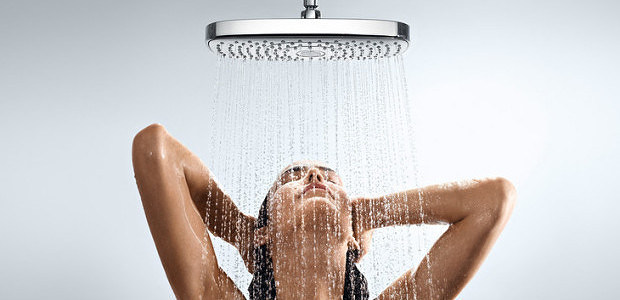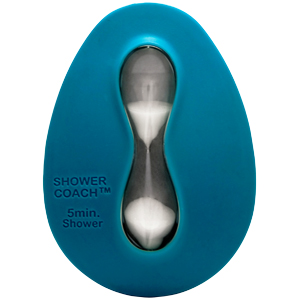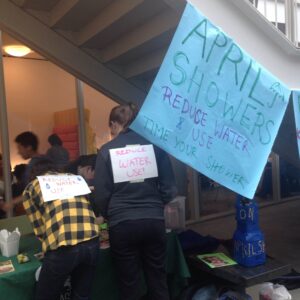
(Image: Hansgrohe International)
Living on the east coast of the United States, it is pretty easy to forget the importance of clean and abundant water. We have plenty of reservoirs, a seemingly constant supply of fresh clean water running essentially free from the tap, and we don’t have water sanctions. It is so easy to take this water for granted, until I read the news about sewage contaminated water in Southeast Asia, the drought in California and the Southwest, or water privatization in Bolivia. It is in solidarity with these communities that I hate to waste water, and I have worked with my college community to do the same.
About the April Showers Water Reduction Contest at Smith College

Using a shower timer is a good way to save water.
In April of 2014, I worked with another student at Smith College to lead a water reduction competition that we called April Showers. We thought targeting shower times was a simple way for busy Smithies to change their habits, and one that could have a big impact. In fact, every minute in the shower uses approximately 2 gallons of water, so cutting back a ten minute shower to seven minutes can have a 30 percent decrease in water use.
For the month of April, we challenged our peers to take a shower in 7 minutes or less. We supplied each bathroom in every house (there are 35 on the Smith campus) with shower timers and made charts for students to check off each day they took a shower in less than 7 minutes or did not shower. The incentive was a free trip for the whole house to Herrell’s Ice Cream in downtown Northampton, well known for their free birthday sundaes and incredibly long lines.
At the end of the month, we tallied up the check marks and awarded the house with the most check marks the long-awaited prize. The winner was revealed at our Earth Week festival. For any Smithies out there, Sessions House won.
A Small Step for Raising Awareness about Conserving Water

Recruiting participants to the April Showers water saving competition at Smith College. Photo: Julia Graham
This was a small step to raise awareness about water consumption and to encourage Smith students to think more about how their actions impact the global environment. It is so easy to get caught up in the “Smith bubble,” which is in some ways very stimulating but in others very isolating. It is often hard to keep up with global news besides what we hear about in classrooms or in organizations of which we are a part.
We hoped that this competition would be a simple way for Smithies to engage with global environmental issues. A shorter shower may seem like a drop in the ocean, but where else do we start?
Tips for Engaging Others
1. Use Powerful Visuals
Numbers are important to reducing water usage, but sometimes it is hard to get excited when hearing that ‘one minute less time spent in the shower will decrease water consumption by 30%’. Instead, offer someone something they can visualize, like the amount of water used in a 10 minute shower uses the equivalent of forty 1-gallon milk jugs!
2. Get Competitive!
Most people are driven to be better by the pressure of friends, and, in the case of our April Showers contest, housemates. The incentive goes up even more when there is ice cream involved.
3. Educate and Engage
Make sure you let people know why it’s important to conserve water, beyond just cost-cutting measures. This is a great time to talk about drought and climate change as well.
Posting Guidelines
This and other stories published on WeHateToWaste.com are intended to prompt productive conversation about practical solutions for preventing waste. Opinions expressed are solely those of the contributors and WeHateToWaste implies no endorsement of the products or companies mentioned. All comments will be moderated. All postings become the property of WeHateToWaste.com.

Pingback: Getting Ready for Earth Day
Hi Julia! Thank you so much for such an insightful and engaging article! I was just wondering if you had any ways to monitor and ensure that your incredible program continues to thrive and make people aware of their water consumption beyond the one month competition?
Hi Julia,
I think this was a great way to raise awareness on conserving water–It was interesting yet enlightening. This event should definitely carry on as an annual event!
I also think that similar events should happen for raising awarenesses for other resources as well such as energy and electricity!
My I-don’t-want-to-know-how-old NYC, erratic shower has led me to a silver lining: cold water = speedier showers! But what I especially wanted to share is that I find it a good idea to turn off the shower when I’m using the soap and then turn it on only when I need to rinse — just aim to do so with one body part at a time; otherwise, you might dry out your skin. Also, if you do take this approach, and you have a user-friendly shower, you might want to wait for a second outside the line of fire so that the cold water in the first second or two doesn’t get you.
Every year, my campus engages in a multi-campus energy reduction competition. Emails are sent out, posters and hung up around campus, and winning is incentivized in order to raise awareness about the competition, provide tips to reduce energy usage, and get as many people involved as possible. This event is usually quite successful. Doing an “April Showers” type of event has never been discussed at our campus’ environmental club meetings, but I think it would be a great event, especially in concert with our current involvement in the Take Back the Tap campaign to ban bottled water from campus. Love the idea!
Bribing college kids with food is the best way to get their attention, props to you. I agree that little movements may not seem like a big deal (and they usually aren’t), but it’s not the specific endeavor that’s most important. Rather, the change in mentality of everyone that participated is what will make the most change over the years. I hope you have more events like this to raise awareness for other causes like energy consumption or waste!
I think that this is a great idea and a cool pilot to try on other college campuses. I agree that giving visuals to help with the effectiveness of communicating the savings or loss of water makes it easier for people to understand and intensifies the impact. The amount of water that is wasted in this country is a major issue that seems to only get attention in the wake of a drought. We should practice being more conscious of our overall consumption, this is a good first step.
I wish I had seen this a couple years ago! During my freshman year of college, I worked with a couple other people in my dorm to start a campaign for people to take shorter showers, and these tips would have been very helpful. While a few people did reduce their shower times, I think having more visuals and making it a competition would have made it more successful.
This post was very fun to read because I participated in something similar throughout my college years. It is a
very important topic and this post does an excellent job at being informative by providing helpful tips at the
end.
What a fantastic way to get more student engaged with simple and easy sustainable actions. We often don’t think about how much waste water we are creating, which is especially dangerous in cities where there is combined waste and sewer water – leaving areas often prone to flooding and unable to recycle gray water. Getting students involved and incentivized is also an excellent way to spread the word, telling family and friends how their actions helped impact their building and earned them some excellent Herrell’s ice cream!
This initiative highlights the importance of inciting collegiate participation. Academia is a prime demographic for environmental activism; intelligent minds, often young and passionate, are eager to spread awareness and take a shot at the status quo. Smith College and the rest of the Five-College-Consortium have been leaders in raising awareness for water conservation and other environmental campaigns in both Massachusetts and the nation.
Really fun and creative way to change the way people view an everyday activity! I had a similar experience in college where our environmental group created a challenge to reduce energy consumption by dorm building, including shutting off lights, unplugging devices when not in use, shorter and colder showers, using cold water to wash clothes instead of hot, hang drying, etc. Competition is a great way to bring some fun to making change in a community, particularly on a college campus where competition fuels just about everything. This is also a great tool to use for kids as they transition from bathtub bathing to shower bathing, which also helps to implant those ideas of conservation early on in development. One of my friends actually has a shower song that she sings that lasts about 4-6 minutes (meaning she has to be done showering by the time the song is over).
As a rainy Pacific Northwest native, I completely agree that communities in areas less prone to droughts often forget to minimize their water usage. Competitions, timers, music to remind you how long you’ve been in the shower are of course great motivators to minimize water usage but I am also curious about the energy necessary to heat up the water. Colder showers may not be appealing in all seasons, but I would love to see some research on the differences in energy saved when comparing cold and hot showers. But on the topic of shower length – I find temperature to be a great motivator for a three-minute shower. Plus, not only are cold showers a good way to shock yourself awake in the morning, they are actually healthier for our skin, hair, and immune system.
Yes taking cold showers also reduces inflammation and redness of skin, which is something that many college students struggle with. These benefits can be used to promote taking cold showers and reduce the energy used to heat water.
This issue is so important and something a lot of us take for granted in the Northeast, especially here in NYC. I have a cousin who used to take an hour long shower, I know crazy right? He’s starting to get better but it’s a daily struggle to get those closest to us to change their habits.